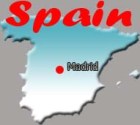Spain to limit judges human rights' crusades
 Madrid - For over a decade, Spanish judges have been stepping up their crusade for universal justice, opening investigations into human rights violations around the world.
Madrid - For over a decade, Spanish judges have been stepping up their crusade for universal justice, opening investigations into human rights violations around the world.
Now, however, a new probe into a 2002 Gaza bombing by Israel is drawing the spotlight on the political problems created by such inquiries, and raising questions about the limits of universal justice.
The government is considering legal changes to prevent judges from pursuing human rights abuses unrelated to Spanish citizens, in what appears to be partly an attempt to limit the damage to relations with countries such as Israel.
Spain rose to the forefront of individual countries prosecuting human rights violations when National Court judge Baltasar Garzon sought the extradition of former Chilean dictator Augusto Pinochet from London in 1998.
Britain declined the extradition on grounds of the ageing general's frail health, but an important precedent was established.
The Pinochet case is widely seen as having encouraged the judicial pursuit of his collaborators in Chile and increased human rights accountability around the world.
The Pinochet case has been followed by a string of Spanish judicial probes into crimes against humanity, genocide or torture, ranging from Argentina, Guatemala and El Salvador to Tibet, Rwanda and Western Sahara.
The highest-profile cases included that of Adolfo Scilingo.
The former Argentine naval officer was detained in Spain and sentenced there to more than 1,000 years in prison for helping to throw government opponents out of airplanes during Argentina's 1976-83 military dictatorship.
Few of the more prominent suspects are likely to face trial in Spain, but the charges against them could make it difficult for them to travel abroad, according to judicial experts.
Most of the human rights cases investigated by Spanish courts have involved Spanish victims, but judges have also begun accepting cases with no links to Spain, such as the alleged genocide in Tibet or the bombing by Israel.
The principle of universal justice allows the Spanish judiciary to tackle crimes such as genocide or terrorism anywhere on the globe, the judges argue.
While human rights activists welcome such investigations, judges like Garzon have also been accused of seeking personal notoriety.
Spain is seen by some as being ill-placed to take an interest in human rights crimes elsewhere, given that it has not tackled those committed by its 1939-75 dictator Francisco Franco.
Spanish probes into human rights abuses abroad have created tension with countries such as China, but Spanish governments have insisted on the independence of the judiciary.
The danger of diplomatic problems became more apparent last week, when National Court judge Fernando Andreu accepted to investigate a complaint lodged by a Palestinian human rights group against Israel over a 2002 bombing in Gaza.
The attack killed Hamas leader Salah Shehade and 14 other people, including several children.
Andreu said Israel could be charged with a crime against humanity, prompting an angry reaction from Israel, which accused the Spanish judiciary of a double standard in not condemning Palestinian violence as well.
Andreu's probe came in what many saw as an anti-Israeli atmosphere in Spain over Israel's new attacks in Gaza.
Massive rallies against the Israeli offensive were attended by prominent artists and even some representatives of Prime Minister Jose Luis Rodriguez Zapatero's Socialist Party.
Andreu's move prompted Israeli ambassador Rafael Schutz to warn of a possible deterioration of diplomatic relations.
The opposition conservatives meanwhile expressed concern that the judicial investigation could jeopardize Spain's hopes of becoming a key intermediary in the Middle East conflict.
Foreign Minister Miguel Angel Moratinos, who is a former European envoy to the Middle East, tried to curtail the damage by informing his Israeli counterpart that the government was preparing legal changes to limit court jurisdiction over human rights abuses in other countries.
The government wants to limit it to cases involving Spanish citizens, people detained in Spain or countries with cultural or historic ties to Spain, according to the daily El Pais.
The reform had been initiated before Andreu launched his probe, and would not affect it retroactively, government sources said.
Far-left and regionalist parties nevertheless protested the government's plans, warning against blocking any investigations into crimes against humanity. (dpa)